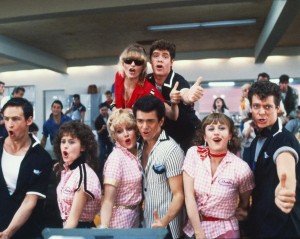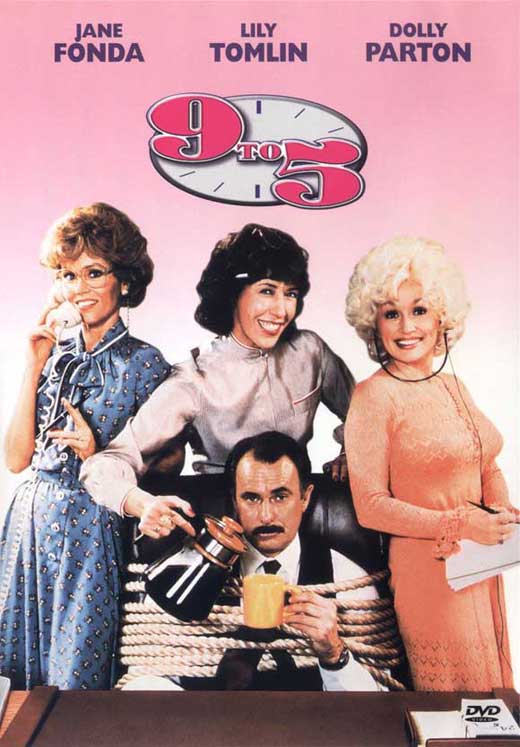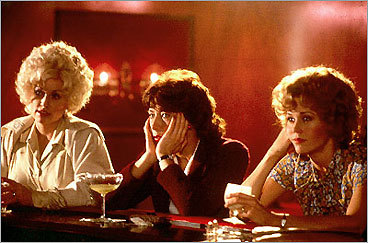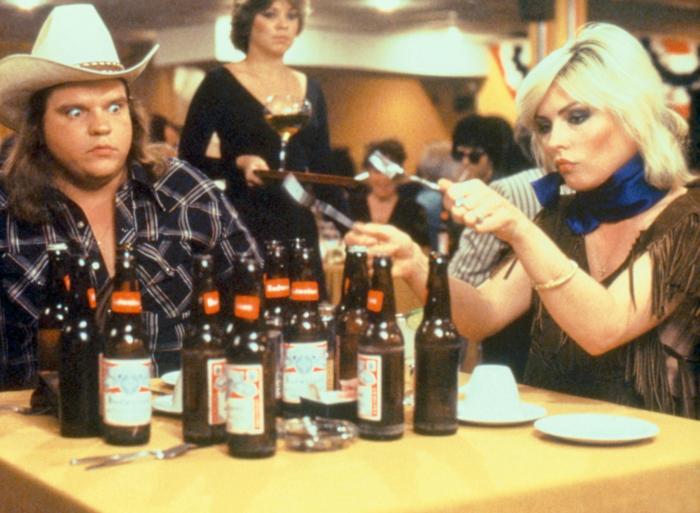August 6, 1982
Fox
Comedy, Musical, Romance, Historical
DVD
B
Released the same summer as Grease 2 and resembling it in some ways, this was aimed at teens, but I at 14 was mostly oblivious to both movies at the time, instead discovering them in heavily edited versions on TV a few years later. I do remember remarking to my then-boyfriend in '86 that this movie was already dated, and no, not just because it's set in the 1800s.
As with G2, the two main themes are time and sex. Like the Gilbert & Sullivan play which this is very loosely based on, this film is set in 1877, when pirate apprentice Frederic-without-a-K (21-year-old Christopher Atkins) is 21 but as a leap-day baby has had only five birthdays. Mabel-also-without-a-K (19-year-old Kristy McNichol), however, declares, in what is probably the worst piece of dialogue in the movie "Frederic, these are the 1880s. You can't live your life by the outmoded conventions of a neo-imperialist society. Find your true center!" To which he replies, "What? You mean Zen piracy?" The movie, which turns out to be Mabel's dream, mostly covers two days, although, as in Sgt. Pepper, there are flashbacks and forwards to things that never happen. (This includes the butler, the only character who's not chewing scenery, emerging from a pond bearing these awesome-looking blue drinks that are in another scene as well.)
There's a series of flashforwards when F & M see each other on a beach and immediately sing a duet about first love. (The movie is apparently influenced by not only Wizard of Oz and a dozen movies that are referenced throughout, including the then year-old Raiders of the Lost Ark, but also The Tempest.) They then share a French kiss and we get this sparkling romantic exchange:
M: Do you live around here?
F: I've never really lived till now....Look, I know this is going to sound silly, but I think I love you. I think might even want to marry you.
M: God, that was a short love scene!
G2 definitely has the more memorable music (more about that later), but PM definitely has the worse dialogue. At one point, Mabel's father, the Modern Major-General, demands to know what's going on, since pirates have invaded his lovely Penzance estate. The Pirate King (executive producer Ted Hamilton) says, "Two words: it's a beach party. And I'm Frankie Avalon." His black sidekick Samuel* (Chuck McKinney) holds up his hands as mouse-ears and says, "And I'm Annette Funicello."
This "two-word" explanation sort of explains the movie, in that, just like in the Frankie & Annette Beach Party series, there's a lot of fourth-wall-breaking and there's an obsession with sex, although almost no one gets laid. (The exception is below.) The sexual references are mostly in dialogue, rather than song (unlike in G2), although some of the updated lyrics to the G & S songs are surprisingly raunchy and there is one song, well, I'll get to that.
The thing is, I can't believe I'm saying this, but the attitude towards sex in G2 is relatively healthy compared to what we get here. If Mabel got this dream analyzed, her therapist would discover that she finds rape and castration (or at least threats to male crotches) hilarious. Starting with the accidental changing of a Chinese pirate captain from "Irish tenor" to "soprano," and continuing on to Mabel kneeing Frederic in the groin when he thinks she's going to kiss him, with her cheerfully telling the audience, "War is hell," there's enough of this sort of humor to please a '90s America's Funniest Home Videos audience. As for the "rape humor," that starts (in the "real-life" sort of first scene) when the guy-who-may-or-may-not-be-named-Frederic tells the crowd that "less than 100 years ago" pirates used to "rape and pillage," which makes Mabel remark, "God, I'd hate to be pillaged!" And there are more jokes like that. Also, there's a lot of "gay" humor, mostly involving the pirates, two of whom Mabel pairs up when she's marrying off her sisters. (Gay weddings were still mostly unimaginable, although I did go to a lesbian wedding in the '70s.)
There is off-screen sex between the blindfolded Pirate King, who thinks he's with Mabel, and Ruth the Nurse. Freddy's nurse from his childhood, except she hits on him. (This happens in the stageplay, too, though.) It never ceases to amaze me that this movie is fondly remembered by people who were little kids (mostly girls) who used to watch it on cable in the years following its release and failure.
Oh, yes, this was a box office bomb, just like G2. I think the 1980s soft-rock ballads have aged surprisingly well, but that doesn't make this a good musical. Not with something like "Pumpin' & Blowin'" in it. (I can't really do justice to that song quickly, but in a few words: double entendres, badly animated fish with legs.) The choreography generally doesn't reach Patricia-Birching, although the MMG number and the two bouts of "Happy Ending" are shockingly amateur. Yes, there are multiple endings, and multiple beginnings. Hell, the movie starts with an old pirate movie clip playing on a VCR, with the words "The End" appearing on the screen before we cut to present day.
I can't believe I've gotten this far without saying what a terrible actor Christopher Atkins is, but he's dreadful. My ex and I used to call one scene the "yulg-yug scene," because he conveys his consternation by saying something like, "Yulg! Yug! THEY'RE ANCHORING OUTSIDE THE COVE!!!" Even when he's not overplaying, he never is in the slightest convincing as a pirate or an actor. (He is OK as a teen idol though, wearing his Blue Lagoon loincloth for several scenes.) McNichol is far from her Little Darlings level, but she's not bad here, if a bit too smirky at times. In their matching blond perms, they're cute together, and let's face it, the romance isn't that convincing in the original play, nor meant to be. Surprisingly, McNichol has a nice daughter-father scene with Bill Kerr, who died just a month ago, at 92, but mostly the movie plays at the level of farce. I no longer find it as equally entertaining as G2 but they would make a hell of a double feature! (Or a double feature in Hell.)
Ken Annakin's rambling 2005 DVD commentary adds little information to the movie and in fact was chosen as a "commentary track of the damned": http://www.avclub.com/article/the-pirate-movie-22325. He had been directing since the '40s and would do The New Adventures of Pippi Longstocking six years after this.
*I go back and forth on whether the Samuel character is the best thing about the movie or an embarrassment. Maybe both. Anyway, kudos to McKinney for giving his all to lines like "Hang five, honkey!" and "Avon calling."
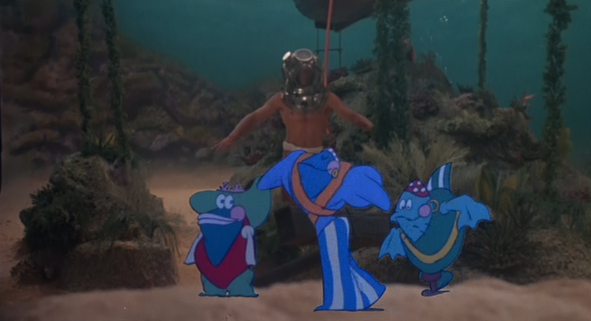 |
| "You're gonna have to swallow something more than water, it's your pride." |
